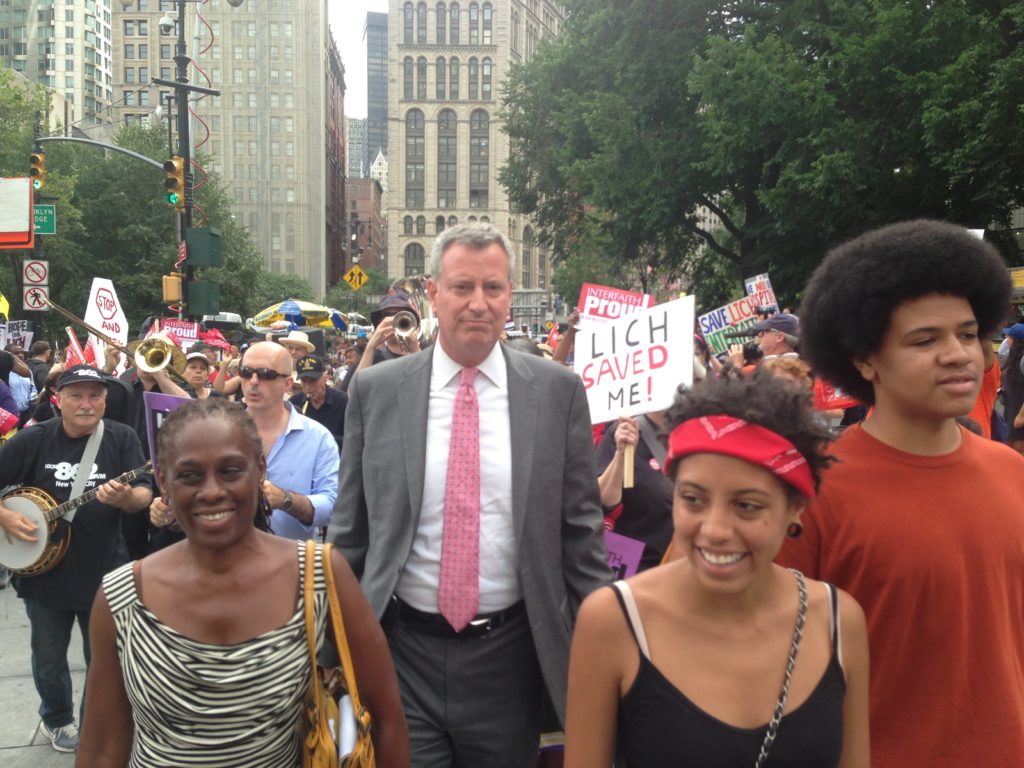Learning Curves
See How They Run: Candidates Mostly Dodge Charter School Questions
Aided by an incurious media, most Democratic presidential contenders have been allowed to slide around charter school issues.

“Learning Curves” is a weekly roundup of news items, profiles and dish about the intersection of education and inequality. Send tips, feedback and announcements of upcoming events to braden@capitalandmain.com, @BillRaden.
Abby Kingsley contributed to this column
One progressive litmus question unasked at last month’s 2020 Democratic presidential debate was on the privatization of the nation’s schools. It’s a pass that tends to be endemic to the mainstream press — a dereliction typified by the mea culpa contained in the New York Times’ June 20 “On Politics” newsletter. That day’s edition was turned over to NYT producer-reporters Alex Burns and Sydney Ember, who interviewed each other in a self-congratulatory hype of Meet the Candidates, their 18-question, 21-candidate video interview series published the previous day. When asked by Burns to name an additional question she’d have liked to ask, Ember volunteered, “Education, another topic I saw someone on Twitter suggest. Policies around student debt, but also universal pre-K and charter schools, have become something of a focus among candidates in recent months.” “That would have been good,” Burns agreed in classic, Old Gray Lady understatement.
Ten of the 2020 candidates were given the chance to rectify the omission at the annual assembly of the National Education Association (NEA) in Houston last week. In 2015, the union (and Capital & Main funder) stirred the anger and opposition of rank-and-file teachers over its political PAC’s premature endorsement of the only candidate who would prove to be even more unelectable than then-NYC real estate developer Donald Trump. To allow the membership to weigh in on the process this time around, NEA president Lily Eskelsen García hosted the Democratic hopefuls at an all-education, two-hour Q&A called #StrongPublicSchools Presidential Forum.
The most forceful speaker? New York Mayor Bill de Blasio, who not only slammed charters but blasted fellow Democrats for cozying up to privatizers: “No one should be the Democratic nominee unless they’re willing to stand up to Wall Street and the rich people behind the charter school movement once and for all,” hizzoner said. (A proposal that would have required the NEA to “demand that all candidates seeking our union’s endorsement publicly state their opposition to all charter school expansion” failed to pass at the Houston convention.) The unambiguously pro-privatization position was staked out by former Texas Congressman Beto O’Rourke. “There is a place for public, non-profit charter schools,” he offered when asked point-blank about his support. Vermont Senator Bernie Sanders — the candidate most burned by the NEA’s precipitous commitment to Hillary Clinton in 2015 — repeated his pledge for a national moratorium on new charters pending a study of their impacts on public schools, and he again vowed to end federal funding for for-profit charter schools.
The 2020 candidates’ positions on charters drew the ire of advocacy non-profit Network for Public Education executive director Carol Burris. A former Long Island high school principal and a 2010 School Administrators Association of New York State Educator of the Year, Burris took the pack to task this week on Diane Ravitch’s blog for sidestepping meaningful opposition to privatization by typically averring that they’re against for-profit charter schools. But non-profit charters good/for-profit charters bad is “a convenient (and false) dichotomy,” she charged: “Don’t be fooled. There are now only 2 states that allow for-profit charter schools — Arizona and Wisconsin.” (California outlawed for-profits last year with the passage of Assembly Bill 406.)
Meanwhile, 35 states allow for-profit charter management organizations (CMOs) to run their non-profit charter schools, and even laws like California’s contain jumbo jet-sized loopholes that permit for-profit subsidiaries of putative non-profit CMOs to fly under the legal radar with schemes like facilities lease-back deals that convert public tax dollars into private wealth.
The correct questions for candidates, Burris adds, are: “Do you support for-profit Charter Management Organizations, and if you do not, what are you going to do about them?” And, “Will you stop the federal funding of new charter schools?” The next opportunity for the debaters to answer them will be CNN’s July 30 and 31 two-nighter, broadcast from Detroit’s Fox Theatre.
Copyright Capital & Main

-

 The SlickJanuary 27, 2026
The SlickJanuary 27, 2026The One Big Beautiful Prediction: The Energy Transition Is Still Alive
-

 Column - State of InequalityJanuary 29, 2026
Column - State of InequalityJanuary 29, 2026Are California’s Billionaires Crying Wolf?
-

 Latest NewsFebruary 3, 2026
Latest NewsFebruary 3, 2026Amid the Violent Minnesota Raids, ICE Arrests Over 100 Refugees, Ships Many to Texas
-

 Dirty MoneyJanuary 30, 2026
Dirty MoneyJanuary 30, 2026Amid Climate Crisis, Insurers’ Increased Use of AI Raises Concern For Policyholders
-

 Featured VideoFebruary 4, 2026
Featured VideoFebruary 4, 2026Protesters Turn to Economic Disruption to Fight ICE
-

 The SlickFebruary 2, 2026
The SlickFebruary 2, 2026Colorado May Ask Big Oil to Leave Millions of Dollars in the Ground
-

 Column - State of InequalityFebruary 5, 2026
Column - State of InequalityFebruary 5, 2026Lawsuits Push Back on Trump’s Attack on Child Care
-

 Column - California UncoveredFebruary 6, 2026
Column - California UncoveredFebruary 6, 2026What It’s Like On the Front Line as Health Care Cuts Start to Hit

